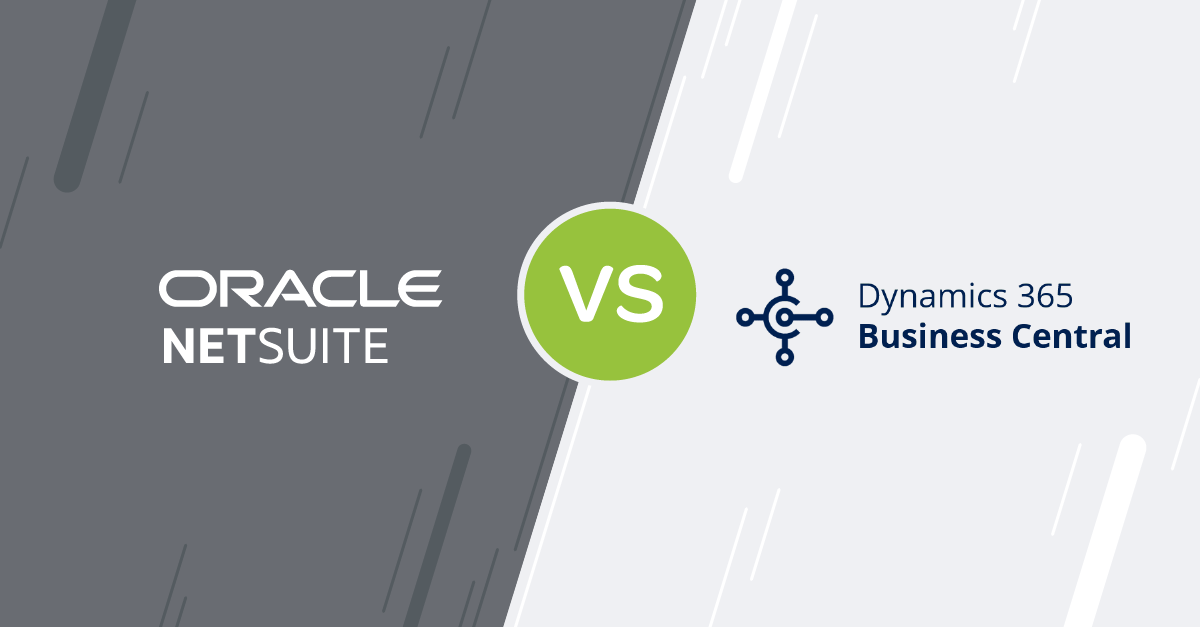Blog
Share this
NetSuite Competitors: The Ultimate Guide

by Jalene Ippolito on June 09, 2022
You’re investing in a new ERP solution that will run your business for the next 10, 15, even 20 years (with proper care and maintenance). NetSuite has likely come up in your search, but you might be wondering what other options are available. If you head to Google, you’ll get a long list of options, to the point that it can be a little overwhelming. That’s why we’ve created this post – to give you a single place to learn about the most common NetSuite competitors. You’ll find a little background information, plus the pros and cons of each solution. Let’s dive in!
What is NetSuite?
NetSuite is the leading cloud ERP solution for growing companies. It’s a scalable solution, allowing you to start with the basics and add in new functionality over time so it can support your changing needs for years to come. And for small to mid-size companies, moving business systems to the cloud is a big plus. You have easy access to your system anywhere you have an internet connection and a computer, with zero IT maintenance.
NetSuite is best-fit for:
Because NetSuite is built as a suite of modules, it can easily accommodate the needs of both small and big companies. For example, if you want to upgrade your accounting software from QuickBooks, you could start with Financials First, then add inventory management, production and other functionality down the road. If you’re a larger, more complex company, you’d likely configure those core pieces all at once in a more traditional ERP implementation.
From an industry perspective, NetSuite is a great fit for wholesale distributors and manufacturers. If you’re a professional services organization, there are options for simple project management and full-scale Professional Services Automation (PSA).
Have questions about NetSuite? We've got answers.
We’re here to help you choose what’s right for your business. Book a quick call with our team to clarify your ERP options and take the next step with confidence.
What are the top NetSuite competitors?
Here, we’re looking at the most common NetSuite competitors, but it’s by no means an exhaustive list. You might also find niche industry solutions in your search, but we won’t touch on them here.
Acumatica
Acumatica is a relative newcomer in the ERP space, building a customer base of about 8,000 since 2003. Their industry editions nicely package the most-used functionality to ease the selection process. One unique thing about Acumatica is its pricing model. Rather than the typical per user, per month fee that you see with other SaaS solutions, pricing is based on transaction volume. This might seem attractive to smaller companies, but fast-growing companies can be caught unaware when suddenly growth in their business means a spike in their software cost.
How Acumatica compares to NetSuite
- Where NetSuite is a pure public cloud solution, Acumatica is a public cloud solution that can also be deployed via private cloud or on-premise. This gives you more choice, but also adds complexity to Acumatica’s product management strategy.
- Both NetSuite and Acumatica work well for wholesale distribution and manufacturing companies. Plus, they’ve each carved out other industry niches. Acumatica has editions for construction and field service (areas where NetSuite isn’t as strong). NetSuite has strong project management capabilities, making it a good fit for professional services, software & technology, and IT services firms.
If you want to go deeper, check out our article comparing NetSuite and Acumatica.
Microsoft Dynamics 365 Business Central
Microsoft is one of the bigger names in ERP, with solutions for both small and mid-size enterprise (SME) and large enterprise. Business Central is their SME cloud solution, based on their legacy NAV system. Currently, it has broad functionality across most business areas, with more robust capabilities being added as the product matures.
How Business Central compares to NetSuite
- Business Central has some gaps in functionality when it comes to multi-country and inter-company financial consolidation. You’ll likely rely on manual consolidation. NetSuite, on the other hand, has strong native functionality in this area.
- Both Business Central and NetSuite provide native reporting and analytics capabilities – and both have some limitations. With Business Central, you can purchase and integrate Power BI to get more advanced functionality. On the NetSuite side, no additional reporting tools are necessary, but you may need to work with your NetSuite partner where deeper technical expertise is needed.
Want the full comparison? Head over to our post on NetSuite vs Microsoft Business Central.
SAP Business One
SAP is well-known in the large enterprise ERP space, with most of the world’s Fortune 500 companies running an SAP solution. In the small to mid-size market, their SAP Business One solution has been a leader for years, with over 70,000 customers worldwide. It’s most often deployed on-premise, but many SAP Business One partners now offer private cloud hosting services to offload the IT infrastructure.
How SAP Business One compares to NetSuite
- SAP Business One is a desktop application and currently has select functionality available in the web client. NetSuite, on the other hand, is fully browser-based. The choice between deployment models really comes down to your preference and what your users need to be most effective.
- Both SAP Business One and NetSuite are a great fit for wholesale distribution and discrete manufacturing companies. With the addition of Eralis Job, SAP Business One works well for companies that need job costing, but don’t have field service or dispatch requirements. If you’re looking for strong project management or Professional Services Automation functionality, NetSuite is the better bet.
- As a public cloud solution, NetSuite automatically releases new versions a couple of times a year. This means you’ll always have the latest features. With SAP Business One, you can choose when you want to upgrade your system. You’ll have more flexibility in the timing of upgrades, but it’s also easy to fall behind if you choose to skip a few new versions.
For more intel, read the full NetSuite and SAP Business One comparison.
SAP Business ByDesign
SAP Business ByDesign is SAP’s first public cloud ERP, designed for mid-market wholesale distribution, manufacturing and professional services companies. It offers strong functionality for production, supply chain management and project management (for field services, repairs, etc.).
How ByDesign compares to NetSuite
- For subsidiaries of larger companies that run SAP S/4HANA or ECC, Business ByDesign can make a lot of sense. The solution comes at a more affordable price point and can be integrated with the parent company’s SAP system.
- NetSuite has a much bigger ecosystem of add-on solutions (called SuiteApps) and integrations that can extend the core ERP functionality. While there are add-ons for Business ByDesign, the options are fewer, which could limit the functionality you have access to.
Epicor
Epicor is a collection of solutions, rather than just one product. In fact, they have over 15 different ERP products for a variety of industries including distribution, manufacturing and retail. This gives you more choice as the customer but also dilutes their product development focus as they need to support multiple solutions.
How Epicor compares to NetSuite
- Epicor is a good fit for mid-market companies with complex distribution requirements but could be overkill for smaller or simpler distributors. NetSuite works well for distributors of all sizes in the SME space and offers more flexibility to add in new functionality as your business grows.
- Where NetSuite is public cloud only, Epicor offers multiple deployment models, so you can choose the one that best fits your needs.
- Epicor has strong supply chain management capabilities but is lacking in CRM sophistication. If you have significant sales and marketing requirements, NetSuite could offer a better balance of functionality across all areas of your business.
Want to keep reading? Check out our NetSuite vs Epicor post.
FinancialForce
FinancialForce is a cloud ERP and PSA (Professional Services Automation) solution designed for professional services firms. The solution leverages Salesforce CRM with tight integration between the two systems to create a complete business management solution.
How FinancialForce compares to NetSuite
- NetSuite offers a range of functionality for professional services firms that simply needs to be configured. FinancialForce, on the other hand, relies heavily on customization to meet business requirements. This can quickly increase cost and complexity.
- FinancialForce is best fit for firms that are already using Salesforce or have developed customizations on the Force.com platform. If you’re starting from scratch or replacing other systems outside of Salesforce, NetSuite could provide more robust functionality and flexibility in the long run.
Read the full NetSuite vs FinancialForce comparison.
SYSPRO
Headquartered in South Africa, SYSPRO ERP software supports about 15,000 companies around the world. Available in both cloud and on-premise deployments, SYSPRO provides robust supply chain management capabilities for wholesale distributors and manufacturers.
How SYSPRO compares to NetSuite
- While SYSPRO has strong supply chain management functionality, it lacks a native ecommerce solution, so you’d be looking at an integration with a third-party solution. NetSuite’s SuiteCommerce solution provides both B2B and B2C ecommerce on the SuiteCloud platform. Plus, you always have the option to integrate with other third-party solutions if you prefer.
- NetSuite’s native production module is a good fit for discrete manufacturing companies. To meet more complex requirements for process manufacturing, the integrated add-on Blend ERP is available. SYSPRO’s Master Production Schedule and Advanced Scheduling are powerful tools if you have more sophisticated manufacturing processes.
Infor
Infor has multiple ERP products that support over 65,000 companies in a variety of distribution, manufacturing and services industries. About 20% of their customers are running cloud ERP solutions, while the remaining 80% are on-premise.
How Infor compares to NetSuite
- One of NetSuite’s advantages is that it’s always been a cloud solution and all product development is done on the SuiteCloud platform. A consistent architecture simplifies customization, upgrades and enhancements. Because Infor was built through acquisition, the solution uses middleware to manage various data models. This can create technical challenges along the way, including exposing you to the risk of version lock.
- Infor is a good fit for mixed-mode manufacturers and has more robust functionality for process manufacturing when compared to NetSuite. Keep in mind that the functionality you get will be dependent on which Infor product you choose, and you won’t have as much flexibility to use multiple products. Because NetSuite is a single product with different modules built on the same platform, adding new functionality over time is easier to do.
IFS
IFS is a European-based ERP software provider making a push into North America in recent years. They have over 10,000 customers worldwide in a range of industries, including aerospace and defense, energy, construction, manufacturing and services.
How IFS compares to NetSuite
- With NetSuite’s modular design, it can work for companies of varying sizes – from start-up to enterprise. IFS is typically best fit for larger, more complex companies (think $100M and up).
- IFS is a strong contender for field services and industries where material and resource logistics need to be planned and executed quickly. NetSuite doesn’t play as well in these spaces, so your industry requirements will likely steer you toward one product or the other, rather than a head-to-head comparison.
- NetSuite has a more robust partner ecosystem, with over 80 in North America alone. Currently, IFS has about 20 partners across Canada and the US, giving you fewer partner options.
Odoo
Odoo is an open-source ERP and CRM platform, giving users the ability to choose the Odoo apps they want and supplement with Community apps for additional functionality.
How Odoo compares to NetSuite
- Odoo is a low-cost modular solution aimed at smaller companies that may not have the budget or requirements for a leading ERP solution. While the cost of a NetSuite solution is higher, you’ll get much richer functionality than what you’ll find in Odoo. Plus, NetSuite’s modular design gives you the option to implement your ERP software in phases to control costs.
- NetSuite has a vast ecosystem of SuiteApps, most of which meet NetSuite’s certification requirements. Odoo doesn’t have a certification process for their third-party apps, increasing the risk of poorly designed apps or integrations that can impact your operations and make upgrades difficult.
For more intel, read the full NetSuite and Odoo comparison.
Sage Business Cloud X3
Sage X3 was originally an estimating and financial management software, providing a strong financial core. With a focus on supply chain management and production, Sage X3 is a popular option for discrete and process manufacturers that want to upgrade from their existing Sage software.
How Sage X3 compares to NetSuite
- Regardless of the ERP software you choose, it’s not uncommon to do some level of customization to accommodate specific business processes. Sage X3 doesn’t support extensive customization, which could limit your options down the road. By comparison, NetSuite is flexible enough to support both minor modifications and more sophisticated customization based on your needs.
- Sage X3 doesn’t offer a native ecommerce solution, forcing distributors to look at integrating with other platforms. With NetSuite’s native ecommerce module, you can keep your entire solution on a single platform (or integrate with other ecommerce solutions).
Sage Intacct
While not a full ERP solution, Sage Intacct could come up in your search if you’re looking for more robust financial software that you can build on over time. In the NetSuite world, you’d be looking at a Financials First implementation that doesn’t include the other ERP functionality.
How Sage Intacct compares to NetSuite
- Sage Intacct is a good fit for SMEs in the services space that want more advanced financial functions, like cost allocation and revenue recognition. You can achieve the same thing with NetSuite’s accounting software and get the flexibility to add other functionality over time.
- Depending on the complexity of your requirements, you may pay less for Intacct, but keep in mind that it’s limited to financials, and you’ll have other systems to handle the other parts of your business. These will either need to be integrated or manually reconciled. With NetSuite, you can implement other modules that connect those business functions to your financial data in the same system.
- Intacct works well in finance-centric industries, like insurance, banking and investment firms. If you have inventory, manufacturing or supply chain requirements, a more comprehensive solution like NetSuite is likely a better fit.
QuickBooks
Here again, QuickBooks isn’t necessarily a head-to-head ERP competitor of NetSuite. But some smaller companies do explore the option of creating a version of an ERP solution by integrating solutions like Fishbowl for inventory and warehouse management.
How QuickBooks compares to NetSuite
- QuickBooks has expanded functionality a bit beyond accounting and now supports payroll, basic inventory, estimates and time tracking. If you need more advanced features in any of these areas, NetSuite is likely going to win the day.
- For small companies that have simple processes and want simple software to match, QuickBooks (plus some add-ons) could work well until you need ERP. But if what you’re looking for is ERP software that connects your entire business in one place, QuickBooks simply won’t do the trick.
Learn more about moving from QuickBooks to NetSuite.
Which ERP software is right for your company?
As a NetSuite partner, we’re big believers in the solution. But we also believe in the right ERP solution for the right company – and that all depends on your business needs.
Hopefully you found this overview helpful as you evaluate your options. If you’re ready to learn more about NetSuite and see how it will work for your business, connect with our team today – we’re here to help.
Share this
Stay in the Know!
Join other SMEs who receive our monthly ERP insights, tips and best practices.
You may also like

ERP Funding for Canadian Businesses

Should You Work with a NetSuite Implementation Partner or Go Direct?



